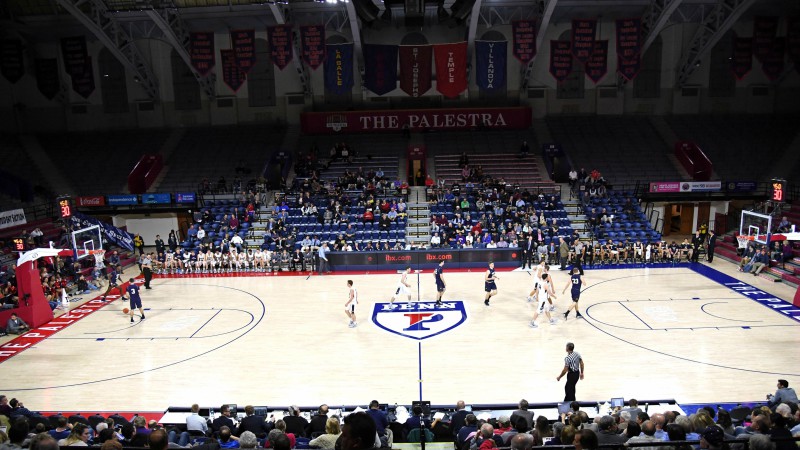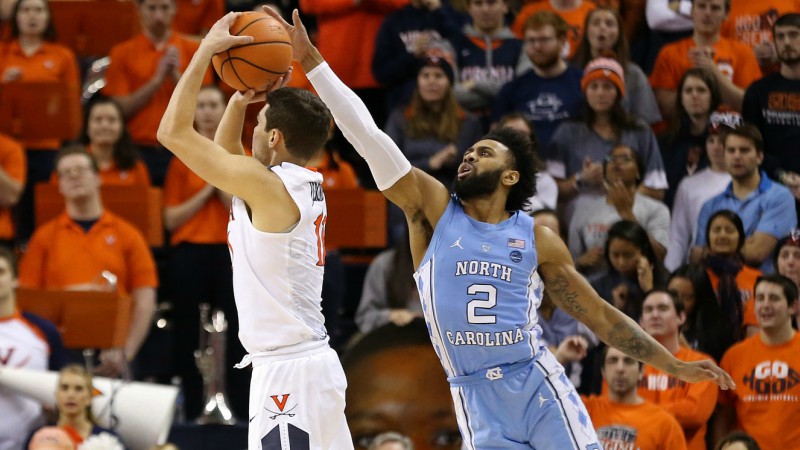Ivy League Tournament Betting Preview: Picks at the Palestra
© Eric Hartline-USA TODAY Sports
Great news: This article, which usually requires a subscription, is FREE to read today. Enjoy! While you’re here, take a look at our gambling-focused tools and content, and sign up for our daily email newsletter to get the best sports betting insight and analysis delivered to your inbox.
The Ivy League does it right with a four-team tournament format, which it switched to last season. It rewards the best regular-season performances, while still allowing for postseason drama. The format also limits the number of opportunities that a dominant regular-season team could lose to a bad team that gets hot on the right day. See Middle Tennessee State, which will probably miss the NCAA Tournament after losing to No. 9 seed Southern Miss in the Conference USA Tournament on Thursday.
2018 Ivy League Tournament Overview
Dates: March 10-11
Location: Palestra, Philadelphia
Defending Champion: Princeton
The second annual Ivy League Tournament will once again take place at the historic Palestra, home of No. 2 seed Penn. Harvard won a tiebreaker with Penn to secure the top seed, while Cornell grabbed the last slot on the final Saturday of the season. Yale also qualified as the No. 3 seed. Missing from the field is Princeton, which won the inaugural event last season.
The home Quakers are the betting favorites to punch a ticket to the dance. Let's take a closer look at both Saturday matchups. I will also finish with my prediction for the Ivy League final.
Cornell vs. Harvard (-6)
12:30 p.m. ET on ESPNU
The Crimson couldn’t have been pleased to see Cornell defy the odds and snag the final ticket to the Palestra. Big Red gave Harvard all it could handle in both regular-season meetings. Cornell ultimately fell short in two tight contests, including a double-OT affair at Harvard in Lavietes Pavilion. (It lost by 10 in that double-overtime loss, failing to cover +9. Talk about a moose!)
So why is Cornell such a difficult matchup for Harvard? It starts with the defensive ball pressure that it can apply. Cornell doesn’t press all that frequently (13.5% of defensive possessions, per Synergy), but the Crimson turned the ball over on 21% of their possessions in league play. That is actually the exact mark they hit against Cornell in both earlier matchups. Injuries (most notably Bryce Aiken) have forced third-string point guard Christian Juzang into action for Harvard. While he’s played phenomenally in the second half of the season, he’s still quite turnover-prone. Cornell must exploit this vulnerability if it wants to pull off the upset.
While Harvard might turn it over at a fairly high rate, it should run offense with ease otherwise. Juzang has become quite reliable in coach Tommy Amaker’s high ball screen offense. The Juzang to Chris Lewis pick-and-roll combo has become a potent offensive force in the half court. Lewis in particular has dominated Cornell, scoring 46 points on 18-of-23 shooting in the two previous meetings.
Simply put, Cornell can’t defend Lewis in pick-and-roll situations or in the post. (Lewis scores a ridiculous 1.32 points ppp as the roller in pick-and-roll, per Synergy.) Coach Brian Earl certainly can’t switch with junior forward Stone Gettings, who is too slow to hedge and recover. Blitzing and trapping Juzang also won't work, as Cornell has poor help-side defense. In the post, doubling Lewis will simply leave guard Seth Towns open. Towns has recently been devastating opponents on the perimeter. Cornell's only defensive hope is to press Juzang to create turnovers and chaos.
Offensively, Cornell has ran Earl’s Princeton motion with a fair amount of efficiency. Cornell features the league’s most potent offensive duo in gunner Matt Morgan and Gettings, a smooth operator in the high post. Harvard’s defense is predicated on half-court ball pressure and taking away the 3-point line. That naturally leaves the Crimson susceptible to Cornell’s excellent backdoor action.
Cornell will likely have a decent amount of offensive success, but I don't think it can generate enough stops on nonturnover possessions to keep this close.
THE PICK: Harvard –6
Yale at Penn (-6)
3 p.m. ET on ESPN2
Penn of course has the advantage of playing on its home court, but both offenses will have exploitable mismatches.
Penn’s offense is a saber dream. Coach Steve Donahue’s philosophy essentially entails getting a close look at the rim with his dual posts or working it inside-out for an open 3. Nothing in between. Per hoop-math.com, Penn attempts 2-point jump shots at the 28th-lowest rate in the country.
Yale coach James Jones has done a phenomenal job getting the Bulldogs into the playoffs without star guard Makai Mason and forward Jordan Bruner, but this is the worst 2PT% defense he has had in New Haven in the KenPom era (since 2001-02). That spells trouble against Penn’s outstanding dual big combo of AJ Brodeur and Max Rothschild.
Rothschild mainly works out of the high post, while Brodeur usually stays low. Their big-to-big passing is among the best I’ve seen nationally. In fact, Rothschild nearly led the Ivy League in assist rate. Yale’s 6-foot-10 forward Paul Atkinson has played decent post defense, but when Jones goes to his big lineup (historically a staple) with forward Blake Reynolds, Yale’s defensive efficiency hasn't improved, while the offense has actually dramatically suffered (.95 ppp in Ivy play). Yale also grades out in just the 27th percentile nationally in terms of ppp allowed out of post double teams, per Synergy. That means Jones has almost no choice but to play Penn’s frontcourt straight up, especially considering Penn has solid perimeter shooting options.
On the other end of the floor, Yale has two potential advantages:
- Given Donahue’s reliance on advanced stats and efficiency-centric game plans, it makes sense that Penn’s defense focuses on aggressively taking away the 3. As a result, Penn's perimeter defenders won’t dig down to help on post feeds to Atkinson, who will routinely see one-on-one coverage. Rothschild grades out as an “excellent” post defender, per Synergy. His matchup with Atkinson could ultimately decide this game.
- On the perimeter, Yale guard Miye Oni is a problem. Penn’s perimeter defense is solid in its assignments, but the players are not particularly strong individual defenders. Oni and even junior guard Trey Phills routinely torched the Quaker perimeter in the second meeting.
Yale improbably won (and covered) that second meeting on an Atkinson buzzer-beater, but Penn has to feel like it took Yale's "best shot" and still should have won on the road. (Yale trailed by five points with 46 seconds left.) Yale's best trio was on fire in that game, and the Bulldogs grabbed their misses at an impressive 38% rate. I don't envision either happening again.
THE PICK: Penn -6
Ivy League Tournament Final Prediction
Harvard over Penn
Photo credit: Eric Hartline-USA TODAY Sports
How would you rate this article?





